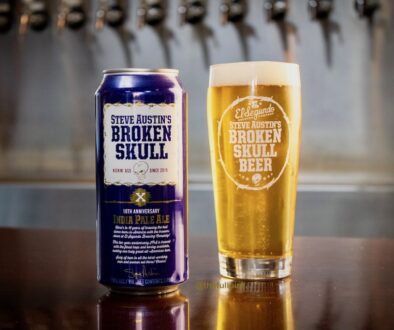Sweetwater Brewing Co. Tastes Success
 Specialty brewer will produce more than 2 million gallons this year
Specialty brewer will produce more than 2 million gallons this year
Anybody who thinks Atlanta’s Sweetwater Brewing Co. is still a quaint little beer-making operation hasn’t seen the “automated palletizer” in action. The robot-like device at the end of the bottling line automatically stacks cases of the chilled (36 degrees Fahrenheit) brew on pallets and swaths them in clear shrink-wrap for shipment. Not much heavy lifting involved. This is what success looks like in the so-called “craft brewing” business.
And few specialty brewers in the Southeast have tasted its rewards like Sweetwater’s co-founder and chief operating dude, 38-year-old Freddy Bensch, who goes by the title “Big Kahuna” on his business card.
“We used to do all of this by hand,” Bensch, dressed in shorts, T-shirt and a baseball cap, said recently as a forklift zipped in to pick up a freshly wrapped pallet of beer. “But we’ve outgrown those days.”
Now in its 13th year of operation, Sweetwater has hit the big-time in the world of small-time breweries. Bensch estimates his company will brew 65,000 barrels (more than 2 million gallons) of beer this year, putting it just behind the South’s biggest craft brewery, Abita Brewing Company in Louisiana, which will brew about 75,000 barrels.
That puts Sweetwater at 29th nationally for sales volume among craft brewers; Abita ranks 19th.
‘A craft power’
Located in shadow of Interstate 85 in the Armor-Ottley Drive warehouse district of Midtown, Sweetwater has not only survived but thrived. It has done so as a litany of other Atlanta-area breweries have vanished over the past decade. Gone is Dogwood. Gone is Marthasville. Gone is Blind Man of Athens.
Sweetwater, meanwhile, has continued to grow. It produced just 1,700 barrels of beer in 1997, its first year. Ten years later that number had grown to 45,000 barrels.
“They’ve been posting double-digit growth year after year,” said Paul Gatza, director of the Colorado-based Brewers Association, which focuses on craft and home-brewers. “They’re definitely a craft power in the South.”
Within five years, Bensch estimates, Sweetwater’s production could nearly double from to about 110,000 barrels annually, the maximum capacity of the current brewing facility. The company recently purchased a vacant 40,000-square-foot shipping warehouse next door, a move that could eventually double capacity again.
But Bensch stressed that “how” his company grows is just as important as how much. Currently, 90 percent of Sweetwater’s product is distributed within a three-hour radius of Atlanta, although Sweetwater is in parts of six states. The beer is not pasteurized, which means it must be shipped and stored cold, giving it a shelf life of about 90 days.
“When we were really small, we grew too fast a couple of times and we were completely scatterbrained,” Bensch said. “We want controlled expansion.”
Rewards of success
Kevin McNerney, Sweetwater’s co-founder and former brewmaster, said the company grew by 30 percent annually for 11 of the 12 years he was there. He left Sweetwater last year to spend more time with his two young children and now brews beer for the Five Seasons Brewing Co. in Sandy Springs.
“Our focus was on the quality of the product and not growing too big too quickly,” McNerney said. “We nourished our growth and made sure we were in the good graces of our community.”
Sweetwater’s success has afforded Bensch some of the trappings of a guy who has worked hard and made it. He has a home in the upscale Morningside community he shares with his 6-year-old son. He’s getting married next year in Telluride, Colo. He occasionally takes time off to surf in Costa Rica or fly fish in Montana. He recently fished in the Patagonia region of South America.
Most of his spare time, he said, is spent with his son and fiancée. He occasionally watches a little TV and gravitates to the Discovery Channel, National Geographic or History Channel.
“I can’t find anything else I like,” he said. “TV has gotten so bad.”
He doesn’t discuss specifics about the finances of Sweetwater, a private company, but insists most of the profits are pumped back into the company.
“I’m paid a salary,” he said. “Everything we’ve made is pumped back into the business. We’ve always been about growing the business and focusing on next week, next year and five years from now.”



